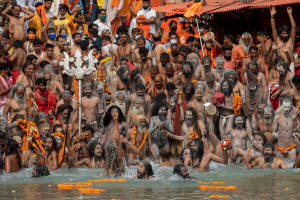Modi appeals for low-key Hindu festival as India's COVID-19 infections
surge
 Send a link to a friend
Send a link to a friend
 [April 17, 2021]
By Rajendra Jadhav [April 17, 2021]
By Rajendra Jadhav
MUMBAI (Reuters) -Indian Prime Minister
Narendra Modi on Saturday appealed to devotees to keep a key Hindu
festival symbolic, amid worries about the spread of COVID-19 infections
as the country reported more than 200,000 new cases for a third straight
day.
Criticism has mounted over the Indian government's handling of the
health crisis, as religious festivals and election rallies continue
despite reports of shortages of hospital beds, oxygen cylinders and
vaccination doses.
India reported 234,692 COVID-19 infections over the last 24 hours,
taking the total number of cases to nearly 14.5 million, second only to
the United States.

Deaths from the disease rose by 1,341 to 175,649.
After hundreds of thousands of ascetics and devout Hindus gathered for
several days along the banks of the Ganges for a religious festival
Kumbh Mela, Modi on Saturday called for restraint, saying on Twitter the
festival should now be kept "symbolic".
Responding to Modi's appeal, one of the religious leaders Swami
Avdheshanand urged devotees to not gather in large numbers. Devout
Hindus believe bathing in the holy Ganges absolves people of sins, and
during the Kumbh Mela, brings salvation from the cycle of life and
death.
Those returning to Mumbai in western Maharashtra state from the Kumbh
Mela will have quarantine in hotels, Mumbai's mayor Kishori Pednekar
said. Maharashtra accounts for quarter of India's coronavirus cases and
is the worst hit region.
Experts have warned about the spread of more contagious variants of the
disease, especially during large-scale gatherings for religious
festivals and political rallies.
On Saturday, Modi was scheduled to hold two rallies in eastern state of
West Bengal where state polls are ongoing. In recent weeks, such rallies
have attracted thousands of people, few of whom follow COVID-19 safety
protocols.
[to top of second column]
|

Naga Sadhus, or Hindu holy men take a dip in the Ganges river during
Shahi Snan at "Kumbh Mela", or the Pitcher Festival, amidst the
spread of the coronavirus disease (COVID-19), in Haridwar, India,
April 12, 2021. REUTERS/Danish Siddiqui

"Stop spreader rallies," the Times of India said in
an editorial on Saturday, adding: "Business as usual is an
unaffordable luxury until this virus is conclusively tamed."
India's daily COVID-19 vaccinations have slowed from their record
high early this month and many state governments have requested more
doses.
Federal Health Minister Harsh Vardhan assured states there were no
shortages and 11.6 million doses would be made available in a week,
adding that 125 million doses have already been administered.
Some state governments in India have raised concerns over hoarding
and black marketing of anti-viral drug Remdesivir.
Nawab Malik, a minister from Maharashtra, accused Modi's federal
government on Twitter for restricting Remdesivir supplies to the
state. A minister in Modi's cabinet, Mansukh Mandaviya, denied the
allegation, saying adequate supplies were being arranged.
After imposing one of the world's strictest lockdowns for nearly
three months last year, Indiaís government relaxed almost all curbs
by the beginning of 2021, although many regions have now introduced
localised restrictions.
"This is Narendra Modiís biggest crisis yet. It is bigger than any
security threat, external or internal, or even the economic
attrition of 2020," prominent editor and political commentator
Shekhar Gupta wrote in a column on Saturday.

(Reporting by Rajendra Jadhav; Additional reporting by Sudarshan
Varadhan; Editing by Aditya Kalra, Kim Coghill, Lincoln Feast and
Christina Fincher)
[© 2021 Thomson Reuters. All rights
reserved.] Copyright 2021 Reuters. All rights reserved. This material may not be published,
broadcast, rewritten or redistributed.
Thompson Reuters is solely responsible for this content. |